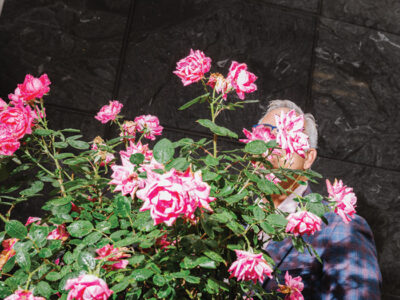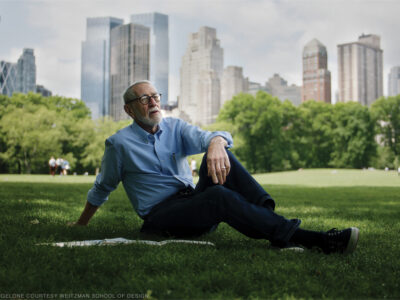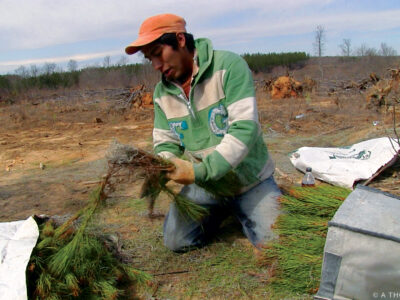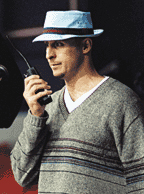
Alumnus scores with a film about the 1980 U.S. Olympic hockey team.
Sports fans may remember Gavin O’Connor C’86 from his exploits as an all-Ivy League linebacker on Penn’s football teams of the mid-1980s, and devotees of independent film from his well-received writing and directing debut, Tumbleweeds [“Alumni Profiles,” May/June 1999]. His first studio film—the recent Disney feature Miracle, about the 1980 U.S. Olympic hockey team and its brilliant coach, the late Herb Brooks—has made more than $60 million and marked him as an emerging directorial star.
O’Connor is partners with his twin brother Greg C’86 and friend Tim Chambers C’85 in the film and TV production company, Solaris Entertainment. He is currently directing Clubhouse, a TV pilot for CBS; his next project is the film Pride & Glory.
Clearly, O’Connor has come a long way since abdandoning his hopes of playing pro football the summer after his senior year to devote himself to a career in film instead. He spoke with Gazette freelancer Kent Malmros C’00 about the journey and the making of Miracle.
While you were at Penn, how did you balance your interest in film with your commitment to athletics—not to mention schoolwork?
To the detriment of my grades, I spent a lot of time writing scripts in my dorm room and I spent a lot of time in movie theaters … in between football practice, working out, and film sessions. So, I guess my schoolwork was third, which at times became a problem … But I always wanted to make movies. That was always my dream.
How did you transition from being a student-athlete into movies after you left college?
I remember very distinctly working out with Tim Chambers, who was one of my closest friends at Penn [and now a business partner]. I was going to try out for a team in the NFL. Timmy had played a year with the [Indianapolis] Colts, and we were spending the summer [after my senior season] working out together.
We were in Franklin Field—it was about 115 degrees on the turf—and we were running. And I just stopped. He asked me what was going on, and I told him my heart wasn’t in football. I had had a good college career, but I was finished with it. I wanted to go make films.
I literally walked off the field, left Timmy standing there, and went back to my dorm room to call my parents to tell them I was moving to New York, which I did. And I started writing short films and plays—and working at bars.
What drew you to the story of the 1980 U.S. Olympic Hockey Team?
Herb Brooks—I was just fascinated with him. He was sort of a hockey “egghead.” He fought so far outside the system. He had such a definitive plan that was going against what everyone else thought. He was such a massive risk-taker and innovator. I just saw him as sort of a mad scientist, and the team was his lab experiment.
Brooks worked closely with you on the film. How important was your relationship with him?
I think I got as close as anyone could get to Herb in the amount of time I knew him. In regard to him being open about his techniques, approaches, and philosophies of the game—he was incredible. It was a little tougher digging information out of him about his personal stories. But he eventually did tell me that stuff.
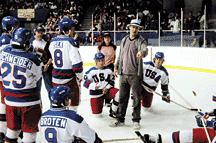
In one of the final scenes of the movie, after the U.S. team defeats the Soviet Union, Herb walks into a hallway to celebrate alone, under the concourse with no one around. Was that one of those anecdotes?
The truth of the matter is that Herb left the bench—the team went out to celebrate on the ice and Herb didn’t go with them. He told me that the way he dealt with his team all year, he could have never gone on the ice with them.
So I asked him where he went, and he looked at me and said, “I went to the bathroom to pee.” I told him, “Well Herb, in my version you celebrate alone.” Herb had said something to me that really resonated—when asking him about the seven-month journey with the team, he said it was the loneliest year of his life. So I thought that image at the end was an interesting way to dramatize the loneliness of what he experienced—being unable to celebrate with the kids he genuinely loved.
How upset were you when Herb died before the film was released?
That really crushed us all. We had become pretty close to Herb. We had just finished shooting, and I was back less than a month when I got the call. It was devastating.
How far in advance did you know Kurt Russell was the actor you wanted to play Herb?
I had met with another actor, who was very interested. Then I requested from the studio that I sit down with Kurt—and I knew after one meeting that he was the guy. I’m really proud of his performance.
Why did you use real hockey players to portray the team members, instead of actors?
I had an idea of the visual style of the film, and what I wanted to do with the cameras on the ice. I knew I needed hockey players to accomplish that. I didn’t want to use body doubles and limit how I chose angles and how I dramatized the action on the ice.
Then the challenge was teaching them how to not “act.” I hate the word acting. It should be called reacting. We saw over 4,000 kids, and it was a matter of finding kids who could play hockey first—they had to get past hockey coaches—then finding kids who were born with the acting gene and weren’t aware of it.
Did that decision cause any casting battles with the studio?
It was a weird thing because they’d support me, but then always mention every young, hip actor in Hollywood and how he would be great in the movie. Then I’d always say, “Can he skate?” And of course the agent would say yes, so I’d tell them to have the kid come down to tryouts and audition on the ice—there’s no hiding on the ice. And they rarely showed up, which was fine. And I ended up getting the kids I wanted, and the studio supported it.
How did the members of the Olympic team feel about the movie when they saw it?
The first time I screened the movie for an audience, the studio flew in [several team members] and Herb’s son Danny. It wasn’t a finished picture yet, but they were very pleased with the film. [Goalie] Jimmy Craig walked over to me and whispered “Thank you” in my ear. I’ll never forget the hug I got from him. It felt great.


